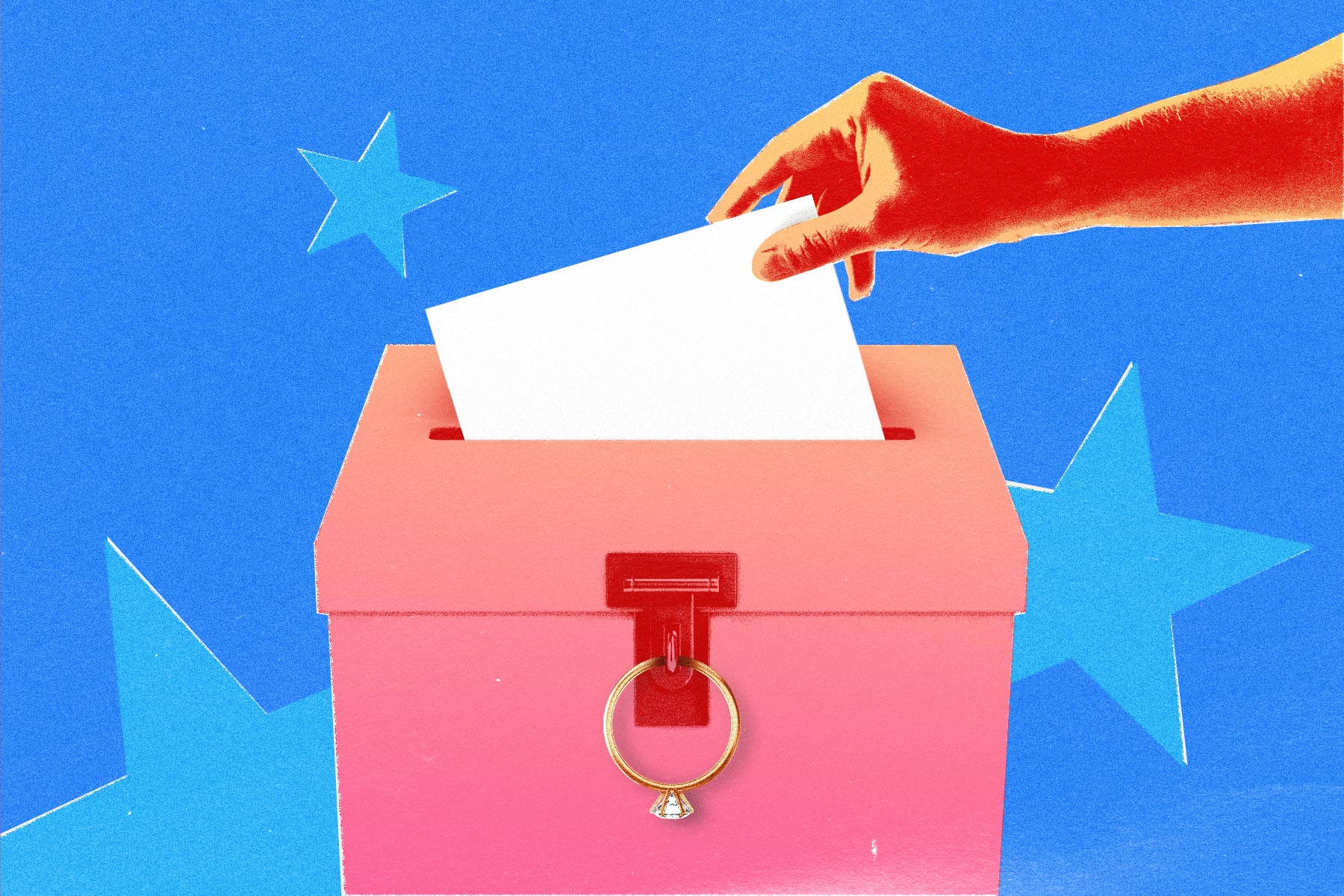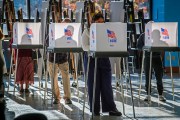Millions of American women have a different last name than what’s on their birth certificates, and House Republicans have prioritized a bill that voting rights groups say could make it harder for them to vote.
Several voting rights groups warn the Safeguard American Voter Eligibility (SAVE) Act — which purportedly aims to block non-citizens from voting, something that is already illegal — will pose a barrier for millions of American women and others who have changed their legal name because of marriage, assimilation or to better align with their gender identity. They also worry it will disenfranchise others from marginalized communities who are less likely to have the necessary documentation readily available. While the SAVE Act faces longer odds in the Senate, it may have a better chance than when it was debated last year.
“It will make it so that people in this country who have every right to vote can’t vote, and for no good reason,” said Hannah Fried, co-founder and executive director of All Voting is Local, a voting rights organization. “We don’t need this hurdle. Only citizens are voting in this country. We have other checks and balances, and this is just a demonstrably unnecessary piece of legislation.”
Lauren Kunis, the CEO and executive director of VoteRiders, an organization that helps Americans obtain identification, said that getting the underlying documentation needed to register to vote can be a “bureaucratic nightmare” for many as is.
-
The Latest:
“We have lots of experience in helping people track down and order vital documents that are increasingly being proposed as required for voter registration,” she said. “So we’re watching with a lot of concern.”
A key Republican lawmaker who is sponsoring the bill in the House and the GOP majority on the House committee overseeing election administration dispute that characterization and claim there will be a way for American citizens to address issues they may face with identification.
“The legislation provides a myriad ways for people to prove citizenship and explicitly directs States to establish a process for individuals to register to vote if there are discrepancies in their proof of citizenship documents due to something like a name change,” said Rep. Chip Roy of Texas in a statement.
Roy and other Republicans have followed the lead of President Donald Trump in spreading the false narrative that ineligible immigrants vote or could be able to vote in large numbers. States have also attempted legislation to ban something that is already illegal. Laws similar to the SAVE Act in Kansas and Arizona have been struck down by judges who said they were unconstitutional and disenfranchised Americans.
“This is giving oxygen to a misleading narrative, to an outright lie that noncitizens are voting in federal elections,” Kunis said. “We know that is not happening, and it’s really disappointing to see this narrative being given such a prominent spot in the public discourse.”
The bill would require an individual to present in person a passport, birth certificate or other citizenship document when registering to vote or updating their voter registration information.
Such a requirement could pose barriers for large swaths of Americans: More than 9 percent of citizens of voting age — or 21.3 million people — do not have documents readily available that prove their citizenship, per a study from VoteRiders, Public Wise, the Brennan Center for Justice and the Center for Democracy and Civic Engagement at the University of Maryland. People of color are more likely than White Americans to lack documentary proof of citizenship, the study found.
Christina Harvey, executive director of Stand Up America, a voting rights organization, noted the impact of such a bill on rural voters who may not have access to proof of citizenship.
“In pushing this legislation, House Republicans — between poor and rural voters and married women — ironically seem to be attacking the voting rights of many of their own folks who are voting for them in their states,” she said.
An estimated 69 million American women and 4 million men do not have a birth certificate that matches their current legal name, according to the liberal Center for American Progress.
Roy, a sponsor of the bill, said the legislation directs states to create a process so people can prove their citizenship if their name doesn’t match their birth certificate.
Roy called questions about the bill’s impact on Americans “absurd armchair speculation.”
“This bill isn’t being attacked because it’ll exclude citizens from voting — it won’t,” Roy said in his statement. “It’s being attacked because the policy is wildly popular with the American people, its opponents want and need illegals to vote, and they’ll use anything they can to attack it.”
In a statement, a spokesperson for the Republican majority on the House Committee on Administration also called claims that the bill would disenfranchise married women voters “false.”
“As long as documentation can be provided that shows citizenship and married status, there should not be any issues when registering to vote,” the spokesperson said. “Providing proof of citizenship is not a new concept.”
House Democrats, for their part, are reintroducing the John R. Lewis Voting Rights Advancement Act, a bill to restore provisions of the landmark voting rights law that the Supreme Court struck down in 2013. The bill has little to no chance of passing in a Republican-controlled Congress, but Democratic leaders are centering voting rights in their messaging.
At a news conference Wednesday, House Democratic Whip Katherine Clark called the SAVE Act an effort to “trick and mislead” the American people.
“It is built on a false premise that there are noncitizens voting in large numbers that are swaying elections. That is a complete lie, and they know it,” she said. “And what is the answer to that? Make it harder for women in this country to vote, who changed their names because they got married? That is voter suppression wrapped up in some sort of immigration argument.”
Eliza Sweren-Becker, senior counsel for the voting rights program at the Brennan Center for Justice, said that text does not establish clear rules for people who have changed their names, particularly married women.
It would eliminate popular methods of voter registration, such as online, mail, and registration drives — forcing people to come into election offices that are already facing staffing shortages, according to Sweren-Becker.
“That would be an extraordinary burden and absolute chaos for election officials,” reshaping who is able to participate in the democratic process, she said.
“It would make new voter registration so difficult, it would make updating your voter registration so difficult — that is why we absolutely need to raise awareness of the disastrous implications of this bill,” Kunis said.
Harvey added that the bill includes penalties for election workers — a predominantly women-led workforce that has already experienced years of harassment and threats due in part to election denialism pushed by Trump and others — who must administer and enforce the law and any rules spelled out on discrepancies in paperwork.
“So any thought that, ‘Oh, well, my local election workers know me,’ or ‘If I just go in to change my address, it would be fine because I’ve been voting in this state or county for years’ — that’s not going to happen when our election workers are actually facing jail time if they get it wrong and don’t impose this law,” she said.
Kunis said the discussion over the SAVE Act, and similar bills filed in state legislatures, strikes at the heart of key questions of who belongs in American democracy.
“The 2026 midterms may seem very far away, but these legislative debates taking place right now will shape how and if eligible voters are able to make their voices heard,” Kunis said. “This is not just moving the goal posts — this is like ripping the goal post out of the field and throwing it to the next town over.”






